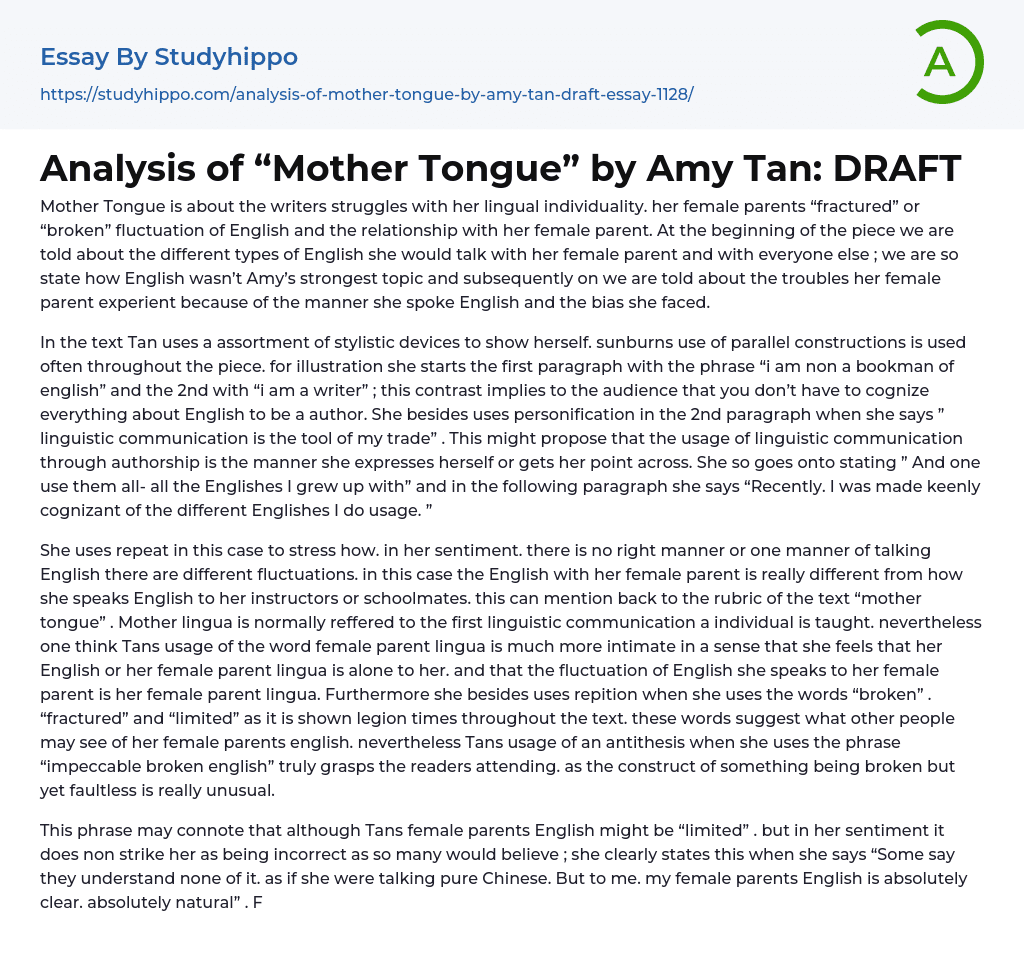

Analysis of “Mother Tongue” by Amy Tan: DRAFT Essay Example
In the text "Mother Tongue," the writer discusses her struggle with her unique language skills and their connection to her mother. She explains how she would modify her English when speaking to her mother compared to others, acknowledging that English was not her strongest subject. Additionally, the passage explores the challenges faced by her mother due to her unconventional English and the discrimination she encountered.
To effectively convey her message, Tan utilizes various stylistic devices in the text. One such device is parallel constructions, where she begins one paragraph with "I am not a scholar of English" and another with "I am a writer." This contrast highlights that being proficient in every aspect of English is not necessary for achieving success as a writer.
In the second paragraph, the author personifies language, stating that it is the tool of her trade. This s
...uggests that she uses language as a means of expressing herself and conveying her ideas. She then mentions using multiple Englishes, indicating that she employs various forms of English that she grew up with. In the following paragraph, she further emphasizes her use of different Englishes and how she became acutely aware of them. Through repetition, she underscores the significance of this awareness.
English can be spoken in different ways depending on the context. For instance, individuals may speak English differently when conversing with their mother compared to when interacting with teachers or classmates. This relates to the idea of "mother tongue," which pertains to a person's initial language acquisition.
Tan believes that her use of the expression "mother tongue" holds great personal significance since she considers her English, or mother tongue, to be distinctively her own.
Furthermore, she frequently utilizes words like "broken," "fractured," and "limited," which are consistently mentioned throughout the text.
These words imply how other people perceive her mother's English, which is influenced by her Chinese background. However, Tan effectively captures the reader's attention by using the opposite terms in the phrase "impeccable broken English." This contradiction of something being broken yet flawless is highly unusual. This phrase may suggest that although Tan's mother's English may be considered "limited" by some, she does not view it as incorrect as many others would. Tan explicitly says this when she mentions, "Some say they understand none of it, as if she were speaking pure Chinese."
Nevertheless, my mother's English is perfectly comprehensible and authentic to me. Moreover, she once again utilizes personification to highlight the evolving quality of her spoken English, describing it as "the intersection of memory upon imagination." In paragraph five, Amy shares various anecdotes and personal encounters to offer the audience a deeper insight into the hurdles she faced during her youth with her mother and the discrimination she endured.
In addition, Amy incorporates dialogue to give the readers a taste of her mother's language. The article aims to showcase that there isn't a single correct version of English; it exists in diverse forms and should be free from discrimination. Amy underscores this point by repeatedly highlighting the terms "English" and "Englishes" within the text.
Tan argues that people often hold narrow and prejudiced views of individuals from diverse cultural or linguistic backgrounds. She supports her claim by sharing her own encounters, particularly her mother's experiences. Tan gives the example of how people would dismiss her mother's credibility based on her
"broken" English, assuming she is uneducated. However, Tan also highlights that her mother reads Forbes magazine, which challenges these misconceptions.
An audience might be quite surprised to discover that an adult female from China, who has "watered-down" English, is able to comprehend complex matters such as listening to Wall Street Week, engaging in daily conversations with her stockbroker, and effortlessly reading all of Shirley MacLaine's books.
This demonstrates Tan's point about how society wrongly stereotypes people based on their language abilities. She uses simple language in the text, yet we can still grasp the complexity of her statement. The final paragraph emphasizes Tan's focus on her audience rather than seeking approval from critics, and she does not feel the need to write like a professor to effectively convey her message. Additionally, she consistently incorporates personal experiences throughout the text, further expanding on them.
- Bias essays
- Big Five Personality Traits essays
- Body Image essays
- Mind essays
- Motivation essays
- Phobias essays
- Thought essays
- Dialect essays
- English Language essays
- Second Language essays
- Semiotics essays
- Sign Language essays
- Spanish Language essays
- Adaptation essays
- Adventure essays
- Adversity essays
- Aging essays
- Alcohol essays
- Barbie Doll essays
- Beauty essays
- Care essays
- Carpe diem essays
- Change essays
- Chess essays
- Chicken essays
- Choices essays
- Contrast essays
- Crops essays
- Development essays
- Dream essays
- Evil essays
- Experience essays
- Family essays
- Farm essays
- Fire essays
- First Love essays
- Focus essays
- Greed essays
- Hero essays
- Holiday essays
- House essays
- Housing essays
- Humility essays
- Humor essays
- Hypocrisy essays
- Integrity essays
- Law of Life essays
- Life Changing Experience essays
- Life Experience essays
- Lifestyle essays



